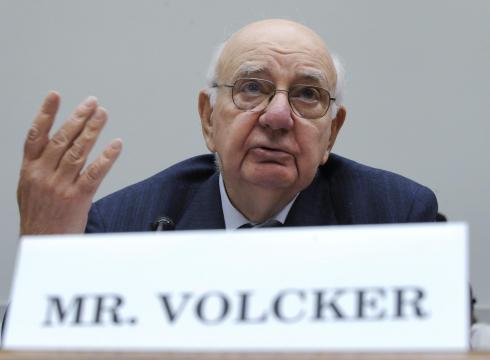Volcker Rule heralds gloomy investment season
- By Sun Qing
 0 Comment(s)
0 Comment(s) Print
Print E-mail China.org.cn, June 22, 2012
E-mail China.org.cn, June 22, 2012
|
|
|
Paul Adolph Volcker, Jr. was the Chairman of the Federal Reserve under United States Presidents Jimmy Carter and Ronald Reagan from August 1979 to August 1987. [File Photo] |
You may have thought 2008 was a turning point for the U.S. banking industry, and you would be partially right as big names like Leman Brothers, Bear Stearns and Merrill Lynch disappeared during that financial storm. For some market insiders, however, a bigger turning point will come when the Volcker Rule is formally implemented on July 21, and markets refuse to give any good information.
Volcker Rule kills big profits
A few days ago, a senior analyst from Citigroup complained to me that the Volcker Rule will cut a tremendous share of revenues of Wall Street banks since it forbids Proprietary Trading (including trading stocks, bonds, currencies, commodities, derivatives, or other financial instruments, with the firm's own money), which has been the most profitable businesses of these banks. "Big names like JP Morgan, Goldman Sachs, Morgan Stanley and Citigroup will all be hit hard. On the one hand, the traditional Proprietary Trading business like arbitrage, for example short selling (which once brought Goldman Sachs huge amount of profit), will be forbidden; on the other hand, the approval for new products and new businesses will be harder, while these new products are most profitable to investment banks."
So for him, compared with the 2008 financial crisis, the most dreadful thing to happen to Wall Street is not the meltdown they had a hand in creating but the ensuing tougher regulations, which he said "will cause a series of dark effects and is bone-deep torture for banks" since they have to change their business model. Holding companies like JP Morgan and Citigroup could rely more on traditional commercial banking instead of profitable investment banking, but investment banks like Goldman Sachs and Morgan Stanley may have to go back to mergers and acquisitions (M&A), and IPOs.
Yet the Volcker Rule is not put into place to kill banks' profits; its intention is to protect investors and common depositors from high risk activities of commercial banks when they use deposited money for speculation. The former Fed President Paul Volcker argued that such speculative activity played a key role in the financial crisis of 2007-2010. Therefore, he proposed the regulators need to say no to these speculation activities, defined as proprietary trading in his namesake rule. From depositors' point of view, enhancing regulator's power in monitoring bank trading helps to protect their deposits. Forcing banks to take fewer risks will also help to ensure that they don't go under and cause global financial catastrophe, whose effects the world still feels five years after the initial market crash.
Markets decline as regulation collateral
Regulations are going against Wall Street banks, and through them they target the entire financial market. Differently from Chinese banks that many consider counter-cyclical, Wall Street banks, especially those with a high reliance on investment banking, are greatly exposed to the current market condition.
For example, the market of Fixed Income, Currency and Commodities (FICC) has been slumping seriously and is still on a downward trend. Some analysts have told me that the market will see a further reduction of 33 percent of the current trading volume. That would be a tremendous loss. Take Morgan Stanley for example, FICC trading constitutes more than one-third of its total revenue, and a 33-percent decrease would translate to 10 percent of contraction for its total revenue. Similar conditions also happen to its peers.
As for more traditional investment banking practices like M&A and traditional capital market businesses, the profit will also slump by 17 percent compared to the first quarter of 2012. In fact, the Q1 data has already been a great disappointment to investors. The number of M&A deals above US$500 million in value dropped by almost a quarter, and those below US$500 million dropped by 20.7 percent. The total value of the M&A deals declined by 32 percent.
Fewer deals mean fewer commissions. Despite hefty sums for large scale M&As (fees for a US$500 million deal is about US$2.5 million, while deals over US$10 billion dollars are traditionally billed at least US$35 million), they are not considered profitable to big names like JP Morgan, or Morgan Stanley, because their costs in human resources are higher than smaller banks such as Jefferies.
Important major source of revenue for these banks comes from IPOs, but this market is also surprisingly shrinking at an accelerating speed.
According to Ernst & Young, global IPO activity has slumped in the first quarter, falling 69 percent to US$14.3 billion in terms of raised capital compared to the same period last year.
Compounded with the shrinking revenues are large amounts of assets, such as the banks' mortgage-backed securities and collateral debt obligations, which will take them between five to eight years to liquidate. It will be no surprise when Wall Street banks turn in lackluster balance sheets for ensuing quarters after Volcker Rule goes into effect, and investors should be prepared for the gloomy business climate to come.
The author is a financial journalist mainly covering international finance and fiscal policy.
Opinion articles reflect the views of their authors, not necessarily those of China.org.cn.







Go to Forum >>0 Comment(s)